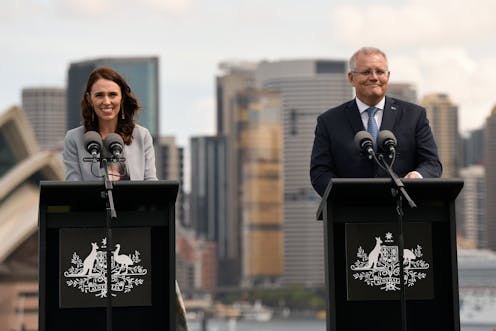Trust in government soars in Australia and New Zealand during pandemic
- Written by Shaun Goldfinch, ANZSOG WA Government Chair in Public Administration and Policy, Curtin University

It has become accepted wisdom that the COVID-19 pandemic has seen trust in government rise across countries. But by how much? And why should it matter?
To answer these questions, we conducted a representative online survey in Australia and New Zealand, with a separate sample for Western Australia, in July 2020, during the first wave of the COVID-19 pandemic.
We discovered a dramatic increase in trust in government. Indeed, 80% of Australians and 83% of New Zealanders agreed government was generally trustworthy, up from 49% and 53% respectively in 2009.
Moreover, this level of trust is far higher than found in studies we have since carried out in several other countries.
With epidemiologists in the spotlight like never before, our research also found high levels of confidence that public health scientists work in the public interest, at 85%.
Both trust and confidence reflect positive views of key actors in the pandemic, are measures of the perceived effectiveness of our systems of government, and reflect a broader trust in expertise and science.
Trust and confidence, in this case, are largely synonymous. Here they reflect a belief that one actor will not systematically exploit the vulnerabilities or power imbalances of another. We trust, more or less, that government does its best to work in the public interest.
The pandemic has perhaps given some governments the chance to rise to the occasion and demonstrate, for all their perceived faults, they could deliver when it really mattered.
Indeed, 72% of Australians and 78% of New Zealanders agreed the government’s management of the COVID-19 pandemic had increased their trust in government. This is important because trust is an overall measure of the “health” and resilience of a governance system, or at least as judged by its citizens.
But trust and confidence have wider importance as well. Research from around the world suggests citizens who trust their governments are also more likely to accept difficult policy changes and act for the wider good.
“Difficult” is definitely a word that springs to mind when we think about 2020. To manage the pandemic, governments around the world have required unprecedented changes in behaviour from their citizens. However, compliance with these measures has varied widely across countries. But both New Zealand and Australia have seen widescale acceptance of emergency measures, and both are world leaders in pandemic control.
Trust has something to do with this success. In our study, trust and confidence were strong predictors of the adoption of policy instruments in New Zealand and Australia.
Indeed, we found trust in government and public health scientists were stronger predictors of use of the COVID-19 phone tracing application than the other measures we used, including education, income and voting patterns.
So people who have trust in scientists and governments are more likely to accept their advice, including making significant changes in behaviour and adopting potentially invasive tools as the COVID-19 app.
So trust and confidence are measures of effective government, but they also make government more effective. This has broader implications beyond just the management of the current pandemic. It suggests trust in government – earned through effective governance – in turn assists crisis management and indeed in more prosaic day-to-day governing. Confidence in scientific expertise may have similar effects.
While state governments have managed COVID-19 slightly differently, we found no significant differences in answers from respondents depending on state. For our study in Western Australia, respondents gave answers more or less the same as received from Australia as a whole, with 83% saying government was generally trustworthy, 75% trusting the federal government, and 74% trusting the WA government.
Income and education were associated with confidence and trust; that is, as both increased, trust and confidence increased. Trust is also slightly higher if the respondent had voted for the government, whether or not that governing party was liberal/left (Labour in New Zealand) or conservative/right (Coalition in Australia).
Read more: Three reasons why Jacinda Ardern's coronavirus response has been a masterclass in crisis leadership
Interestingly, confidence in public health scientists is also associated with support for the party in government in both countries. This suggests the conservative ideological link associated with lower trust in science and experts in American studies is not reflected in Australia and New Zealand. These two countries have managed to avoid the large-scale politicisation of pandemic control, making science, well, a matter mostly for scientists.
We are perhaps only understanding part of the picture here. We are conducting further studies around the world looking at broader control measures, including use of face masks and social distancing, and what predicts their use. So we hope we can build on this and our other studies to inform a better understanding, and better policy responses, for the future.
It remains to be seen whether the increase in trust we discovered translates to an increase in trust in government in the long-term. Perhaps as life returns to more-or-less normal - if it ever does - trust will also return to pre-pandemic levels.
But we hope the lessons we have learned will persist.
Authors: Shaun Goldfinch, ANZSOG WA Government Chair in Public Administration and Policy, Curtin University



















